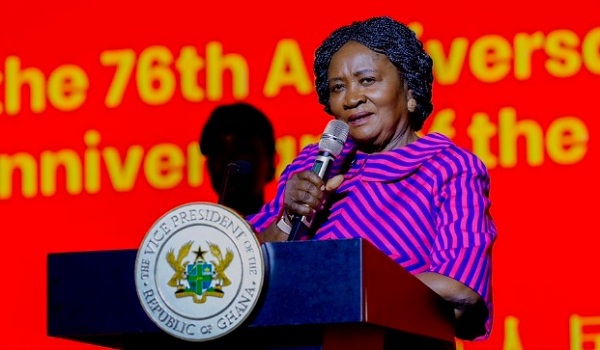Ghana's Vice President Professor Jane Naana Opoku-Agyemang has acknowledged the invaluable contribution of China to the country's socio-economic advancement, urging the authorities to continue to work together for the good of the people.
She said it was imperative to deepen collaboration in new areas, citing energy, renewable power, digital technology, and trade facilitation, in order to address emerging development challenges.
Addressing the 65th Anniversary of China-Ghana Diplomatic Relations in Accra, the Vice President stressed the need to continuously maintain the foundation and principles underpinning the two countries' long-standing ties.
The ceremony, coinciding with the commemoration of the 76th Anniversary of the Founding of the People's Republic of China, treated the participants to a splendid cultural art display led by the Anhui Performance and Arts Group.
They were supported by the Confucius Institute at the University of Ghana, Legon.
Ghana and China established diplomatic relations on July 05, 1960, making the West African country one of the first countries on the continent to recognise the People's Republic of China.
That partnership was through the instrumentality of leaders, including Ghana's first president, Dr. Kwame Nkrumah, who supported China's entry into the United Nations (UN) and maintained close ties during the Cold War era.
After a brief period of strained relations, following a coup in Ghana in 1966 that toppled the Nkrumah Administration, diplomatic ties were restored in 1972.
Since then, the two nations have worked closely at the governmental and people-to-people levels, exchanging ideas and expertise to advance the cause of humanity.
Practical cooperation has been steadily reinforced, especially in the areas of agriculture, health, science and technology, as well as education and cultural exchanges.
Currently, the Asian economic giant remains Ghana’s largest trading partner and a major source of foreign investment, with bilateral trade reaching a new high of some 11.8 billion US Dollars in 2024, according to the Chinese authorities.
Vice President Prof. Naana Opoku-Agyemang said the country was ready to ensure that trade relations between the two countries translated into sustainable local development.
Consequently, the Government had stepped up efforts to build local capacity to enhance Ghanaian investments in China.
She congratulated China on its 76th Anniversary celebration as a Republic, citing the struggles and determination of the people to succeed as a nation.
The Chinese Ambassador to Ghana, Tong Defa, said hundreds of Chinese enterprises had invested locally, covering sectors such as infrastructure, manufacturing, mining, aviation, green energy, and petroleum refining.
That had created tens of thousands of jobs to better the lives of the people, he emphasised.
"China highly appreciates Ghana’s firm support of China’s core interests, including the one-China principle. China also supports Ghana’s adherence to the Pan-African tradition," the Ambassador noted, reemphasising the need for the two people to continue to share development ideas.
He pointed out that, in September 2024, bilateral relations between the two countries were elevated to a Strategic Partnership, which charted a new course for further development.
"The people-to-people exchanges have deepened the roots of bilateral friendship," he said.
Chinese universities have established three Confucius Institutes in partnership with their counterparts in Ghana, enabling over ten thousand Ghanaian students to study the Chinese language.
"The 14th Chinese Medical Team is providing healthcare services and introducing Chinese medical experience, gaining wide popularity," Ambassador Tong added.
GNA





